
20 KANJIS: Does your kanji tattoo mean what you think it does? |
Every individual is at once the beneficiary and the victim of the linguistic tradition into which he has been born - the beneficiary inasmuch as language gives access to the accumulated records of other people's experience, the victim in so far as it confirms him in the belief that reduced awareness is the only awareness and as it bedevils his sense of reality, so that he is all too apt to take his concepts for data, his words for actual things.– Aldous Huxley
I hear people say all the time that the sheets of kanji (“Japanese writing”) that you see in tattoo studios aren’t accurate… that your tattoo of “beautiful soul” more likely actually means something along the lines of “very good sushi”. With the aid of Dita, webmaster of BMEJapan.com, I chose twenty random tattoos from the BME galleries and asked her what they actually meant.
| Tattoo | Meaning |
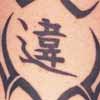 |
They say it means: “To be different”
Actual meaning: “Difference” — the tense isn’t quite right, but it’s close at least — difference and different are pretty similar. |
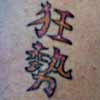 They say it means: “Mad power”
They say it means: “Mad power”
Actual meaning: “Crazy force” — translating slang is going to be vague at best. Literally it’s probably as close as you’re going to get in two characters, but will it be understood?
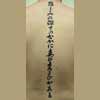 They say it means: “Within the depths of sorrow, there is joy”
They say it means: “Within the depths of sorrow, there is joy”
Actual meaning: “Withing the depths of sorrow there is true joy”. Done perfectly — maybe quoting from a Japanese calendar is a good idea!
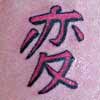 They say it means: “Extreme change”
They say it means: “Extreme change”
Actual meaning: “Strange weird” — I’d say that’s a “no match”…
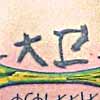 They say it means: “Taurus”
They say it means: “Taurus”
Actual meaning: The symbol on the left appears to be “big”, and the one on the right isn’t even Kanji…. So who knows what or if it actually means anything. I’d just tell people it’s a Blair Witch tattoo.
 They say it means: “Modified Soul”
They say it means: “Modified Soul”
Actual meaning: “Modified Soul” (you thought this one was going to be wrong, didn’t you, but it turns out Dita translated it for the wearer!)
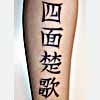 They say it means: “Without a friend in the world”
They say it means: “Without a friend in the world”
Actual meaning: This is a well known expression; “no-win situation”. I suppose one could sort of say it means the same thing, but hey, only James Tiberius Kirk can win the Kobayashi Maru.
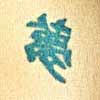 They say it means: “Stylish”
They say it means: “Stylish”
Actual meaning: Not only does this not say “stylish”, but it doesn’t even really say anything — the stencil was put on backwards so it’s reversed. Were it not reversed it would say “dream”.
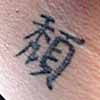 They say it means: “Depression”
They say it means: “Depression”
Actual meaning: This is actually a Chinese character which means “collapse”.
Actual meaning: “Drunk” (and very nicely brushed too!)
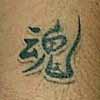 They say it means: “Soulmates”
They say it means: “Soulmates”
Actual meaning: “Soul” — which no more means “soulmates” than “to masturbate” means “to have sexual intercourse”.
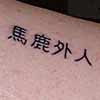 They say it means: “I’m a stupid round-eye”
They say it means: “I’m a stupid round-eye”
Actual meaning: “Stupid foreigner” or baka gaijin!
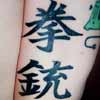 They say it means: “Pistol”
They say it means: “Pistol”
Actual meaning: “Pistol”
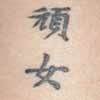 They say it means: “Naughty girl”
They say it means: “Naughty girl”
Actual meaning: This appears to say “closed-minded woman”. Not only is the grammar attrocious — these symbols shouldn’t be used together like this — but it also means pretty much the opposite of what they thought.
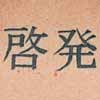 They say it means: “Enlightenment”
They say it means: “Enlightenment”
Actual meaning: “Enlightenment”
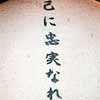 They say it means: “To thine own self be true”
They say it means: “To thine own self be true”
Actual meaning: “To thine own self be true”
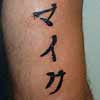 They say it means: “Mike”
They say it means: “Mike”
Actual meaning: This is not actually kanji, but katakana. Literally it means “Ma-i-ku”, the closest translation of “Mike”.
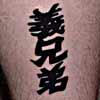 They say it means: “Sworn brothers”
They say it means: “Sworn brothers”
Actual meaning: “Adopted brother” — given the context (about a dozen friends all got this tattoo together) it probably makes sense.
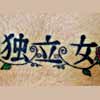 They say it means: “Independent woman”
They say it means: “Independent woman”
Actual meaning: It does mean “independent woman”, but the grammar is really. These characters shouldn’t be used together like this, but the meaning still comes across.
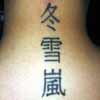 They say it means: “Winter blizzard”
They say it means: “Winter blizzard”
Actual meaning: “Winter snow wind”
It’s important to also add that kanji characters gain a lot of their meaning from context (that is, how they’re used, what letters they’re around, and so on). Because of that, it’s difficult to accurately translate single-character kanjis because they don’t have a context.
In any case, yes, I realize this is the most “fluff” piece I have ever written, but I hope you enjoyed it. I suppose I could go on with explanations of how to find kanji meanings and so on, but it should be obvious: learn to read and write Japanese!
Personally I wouldn’t get something that I didn’t understand first hand tattooed on me, but if you decide to go for kanji and don’t read it yourself, at least do yourself the favor of asking someone you trust for help.
Sincerely,

Shannon Larratt
BMEzine.com
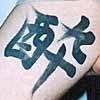
 BME/News and Modblog highlight only a small fraction of what
BME/News and Modblog highlight only a small fraction of what
This is exactly why it’s important to do your research. If you don’t have total faith in your own Japanese abilities then find someone that you can trust for your translation, such as a native Japanese speaker.